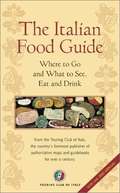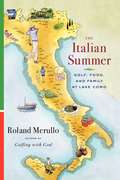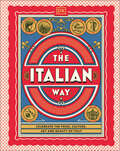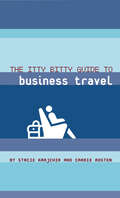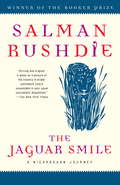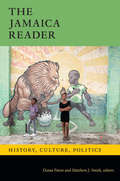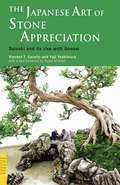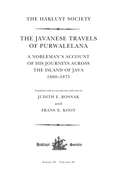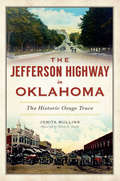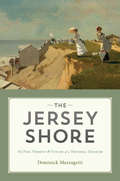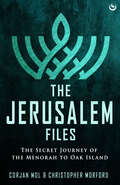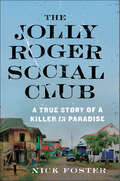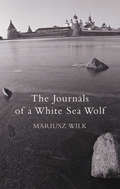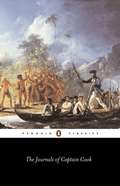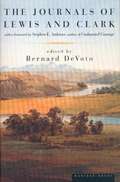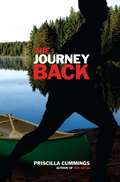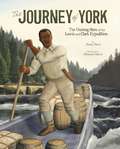- Table View
- List View
The Italian Escape: A feel-good holiday romance set in Italy - the PERFECT beach read for summer 2021
by Catherine ManganSparkling sea, sun, delicious food and Aperol Spritz - escape to Italy with the perfect summer romance . . . Niamh Kelly's life hasn't turned out quite as she'd expected. She's thirty-three, still living at home and was recently dumped . . . by her boss. So when her sister invites her to tag along on a work trip to the sun-drenched Italian coast, Niamh jumps at the chance, eager to escape into a world of sparkling prosecco, delicious food, and breath-taking beaches.Upon her arrival, Niamh immediately falls in love with the beautiful Italian town they're staying in and realises she never wants to leave, deciding instead to stay and open up a quaint coffee shop nestled in charming old town streets - even if she has no idea what she's doing. But when a family tragedy and a tricky tourist season threaten her new business, Niamh isn't so sure she can stick it out. With help from her new-found Italian friends - and the possibility of romance on the horizon - can she make her new life in the sun a success?A glorious and uplifting escapist novel set against the stunning backdrop of the Italian coast. The perfect holiday read for fans of Rosanna Ley, Rachel Hore and Karen SwanEarly readers LOVE The Italian Escape:'This book is the perfect escape. Curl up and enjoy''Beautifully written . . . I just wanted the experience to go on for longer''I really enjoyed this book . . . recommended holiday reading'
The Italian Fiancé
by Victoria Springfield'A wonderful story told with lightness, emotional insight and humour' FIVE STARS'The backgrounds are so well described one could actually be there' FIVE STARS'The Author took us on an unforgettable adventure. Highly recommended' FIVE STARSIt's never too late for happily ever after...When sisters Cassie and Lisa receive a wedding invitation, the last person they expect to be getting married is Jane, their seventy-year-old aunt! Convinced that she's making a big mistake, the two put their differences aside to travel to the vibrant Tuscan city of Lucca. But there's something magical about Italy ...and this trip may just change their relationship - and their lives - forever.Jane knows it's not just a holiday fling. After her husband of four decades passed away, Jane never thought she'd find love again. But Luciano, with his big heart and artistic flamboyance, fills her life with colour. Can she convince her nieces it's never too late for a second chance?Perfect for fans of Nicky Pellegrino, TA Williams and Sue Moorcoft, take an unforgettable trip to sunny Tuscany with Victoria Springfield's The Italian Fiancé.***Readers are loving The Italian Fiancé!'I bought this as soon as it came out and thoroughly recommend it' 5 STARS'I have read all the author's books because they are so beautifully written' 5 STARS'I loved the characters, they truly came to life in Tuscany' 5 STARSThis author gets better with each book' 5 STARS'It's one of those books that you can lose yourself in' 5 STARS
The Italian Fiancé
by Victoria Springfield'A wonderful story told with lightness, emotional insight and humour' FIVE STARS'The backgrounds are so well described one could actually be there' FIVE STARS'The Author took us on an unforgettable adventure. Highly recommended' FIVE STARSIt's never too late for happily ever after...When sisters Cassie and Lisa receive a wedding invitation, the last person they expect to be getting married is Jane, their seventy-year-old aunt! Convinced that she's making a big mistake, the two put their differences aside to travel to the vibrant Tuscan city of Lucca. But there's something magical about Italy ...and this trip may just change their relationship - and their lives - forever.Jane knows it's not just a holiday fling. After her husband of four decades passed away, Jane never thought she'd find love again. But Luciano, with his big heart and artistic flamboyance, fills her life with colour. Can she convince her nieces it's never too late for a second chance?Perfect for fans of Nicky Pellegrino, TA Williams and Sue Moorcoft, take an unforgettable trip to sunny Tuscany with Victoria Springfield's The Italian Fiancé.***Readers are loving The Italian Fiancé!'I bought this as soon as it came out and thoroughly recommend it' 5 STARS'I have read all the author's books because they are so beautifully written' 5 STARS'I loved the characters, they truly came to life in Tuscany' 5 STARSThis author gets better with each book' 5 STARS'It's one of those books that you can lose yourself in' 5 STARS
The Italian Food Guide: The Ultimate Guide to the Regional Foods of Italy (Dolce Vita Ser.)
by Touring Club of ItalyLooks at the culinary traditions of each region of Italy and provides restaurant listings, hotel listings, and descriptions of regional specialties and local products.
The Italian Holiday: The perfect holiday escape to Italy for sun, sea and spaghetti!
by Victoria SpringfieldShortlisted for the RNA's Joan Hessayon Award for New WritersSun, sea and spaghetti... Italy was Bluebell's dream destination, but taking her granny's place on the Loving and Knitting magazine competition holiday she'd won wasn't quite what she'd had in mind. For one thing she didn't knit and for the other...well being single probably discounted her from the love category too. But a free holiday is a free holiday and it's the perfect escape from her lacklustre life. Michela didn't think she'd be returning home to the Amalfi Coast so soon but a new job at her cousin's restaurant on the harbour of Positano is a dream gig, miles away from the grey London clouds. This time though, she vowed not to fall into old habits, Stefano was the past and now a bright future beckons. But under the Italian skies a whole host of possibilities await and maybe happy-ever-after is just a plane ride away... ***Readers are loving The Italian Holiday!'Loved this book - a charming tale set in Minori, on the beautiful Amalfi coast, a story of unlikely holiday companions, friendship and yes a touch of romance' FIVE STARS'A sunny feel-good book, with a colourful description of the Amalfi coast that will have you reaching for your passport!' FIVE STARS'This is a brilliant first novel, and I hope it will be the first of many' FIVE STARS'A wonderfully crafted novel with twists and turns along the way. Definitely a five star book' FIVE STARS'Thoroughly enjoyed this book, vivid descriptions and lovable characters!' FIVE STARS'A lovely story of love, friendship and family. Victoria's debut novel and definitely worthy of five stars' FIVE STARS
The Italian Summer
by Roland MerulloFore, bella! From the author of critically acclaimed Golfing with God comes a charming narrative of a hole-in-one trip through Italy -- a glorious summer of golfing, eating, and learning how to slow down and enjoy life. In the summer of 2007, Roland Merullo was feeling a little burnt out by the frantic pace of his life in the United States and decided to rent an Italian villa near the shore of Lake Como. He arrived in Italy with his wife and two young daughters, hoping the Mediterranean air would teach him to appreciate the more relaxed, Italian way of living: a focus on food, family, and fun. An avid golfer and golf writer, Merullo also set out to enjoy one of Italy's lesser-known treasures: excellent golf on some gorgeous courses. With his customary wit, keen eye, and down-to-earth style, Merullo shares this fascinating account of his summer in Italy, offering detailed and often humorous descriptions of wonderful meals, colorful characters, rounds of golf at some of the most beautiful courses in Europe, and precious time spent with family. The Italian Summer brings to life the myriad joys of Italian existence in a way that all lovers of food, wine, travel, and the proverbial "good walk spoiled" will savor.
The Italian Way: Everything We Love About Italy
by DK TravelFall in love with Italy all over again.There are endless reasons to love Italy. This beautiful country has us hooked on morning espressos and afternoon spritzes, bowls of pasta and slices – oh, so many slices – of pizza. It has us wearing chic street style, admiring great art, driving gleaming sports cars. Heck, it even has us thinking about the Roman Empire. Italy has seduced us all, and we’re here for it.In this love letter to the world’s favourite country, you’ll find everything you know and love about Italy:HISTORY AND HERITAGE celebrate Italy's history, ancient UNESCO sites and Italian art, like masterpieces of the RenaissanceNATURAL BEAUTY explore Italy’s beautiful regions, including the lakes, cities like Florence and Milan, and the mountainsFOOD AND DRINK celebrate the Italian cookbook, food culture and beloved drinks like Italian wineSOCIAL LIFE dive into everyday life, from the Italian language to la dolce vita traditionsFASHION AND DESIGN learn about Italian fashion, traditional crafts and architectureART AND CULTURE discover the literature, cinema and opera that define ItalyThis is not an Italy travel guide – it’s a cultural companion, packed with striking photography, fascinating insights and real stories that bring Italy to life.Looking for travel gifts? The Italian Way is perfect for the culturally curious, lifelong learners and all those who want to live the Italian life.
The Italians
by John HooperA vivid and surprising portrait of the Italian people from an admired foreign correspondentHow can a nation that spawned the Renaissance have produced the Mafia? How could people concerned with bella figura (keeping up appearances) have elected Silvio Berlusconi as their leader--not once, but three times? Sublime and maddening, fascinating yet baffling, Italy is a country of seemingly unsolvable riddles.John Hooper's entertaining and perceptive new book is the ideal companion for anyone seeking to understand contemporary Italy and the unique character of the Italians. Digging deep into their history, culture, and religion, Hooper offers keys to understanding everything from their bewildering politics to their love of life and beauty. Looking at the facts that lie behind the stereotypes, he sheds new light on many aspects of Italian life: football and Freemasonry, sex, symbolism, and the reason why Italian has twelve words for a coat hanger, yet none for a hangover.Even readers who think they know Italy well will be surprised, challenged, and delighted by The Italians.
The Itty Bitty Guide to Business Travel
by Carrie Rosten Stacie KrajchirThe Itty Bitty Guide to Business Travel is a pocket-sized travel agent, personal organizer, and stress-reliever all in one. Perfect for the young professional, the advice in these pages covers everything a business traveler needs to know, from getting a handle on trip goals and preparing colleagues for an extended absence, to finding the best deals and making efficient use of travel time. Lists of helpful questions assist readers in determining their trip needs, and handy checklists make it easy to get out the door on time, with no last-minute panic. The perfect on-the-road companion, The Itty Bitty Guide to Business Travel gets travelers there and back again -- job well done.
The Jaded Aboard or the New Programs Process
by Frank Adamsfrom the book's back cover ... Readers will feel like invisible stowaways accompanying Frank Adams on a Mediterranean cruise, in The Jaded Aboard, a modernized version of the Grand Tour. The author and his fellow passengers are not exactly Mark Twain's The Innocents Abroad, but rather a group of Americans who view Europe as a "grand playground," until they see history looking down on them from the Parthenon. For our "International Conversationalist" author, "hitchhiking has become a lost art." Inspired by a desire to "cram Europe into twelve days of tourism," and carrying Lingo 14 software, he sets out to explore cities from Istanbul to Barcelona. This book presents irresistible adventure and fun, narrated thoughtfully and humorously. FRANK ADAMS is employed as a systems analyst and is by no means a jaded traveller. He resides in his native New Jersey where he earned his B.A. from Rutgers State University in Computer Science. Now employed as a computer analyst, Adams enjoys writing music and songs in his spare time.
The Jaguar Smile: A Nicaraguan Journey
by Salman Rushdie“I did not go to Nicaragua intending to write a book, or, indeed, to write at all: but my encounter with the place affected me so deeply that in the end I had no choice.” So notes Salman Rushdie in his first work of nonfiction, a book as imaginative and meaningful as his acclaimed novels. In The Jaguar Smile, Rushdie paints a brilliantly sharp and haunting portrait of the people, the politics, the terrain, and the poetry of “a country in which the ancient, opposing forces of creation and destruction were in violent collision.” Recounting his travels there in 1986, in the midst of America’s behind-the-scenes war against the Sandinistas, Rushdie reveals a nation resounding to the clashes between government and individuals, history and morality.
The Jamaica Reader: History, Culture, Politics (The Latin America Readers)
by Diana Paton and Matthew J. Smith, editorsFrom Miss Lou to Bob Marley and Usain Bolt to Kamala Harris, Jamaica has had an outsized reach in global mainstream culture. Yet many of its most important historical, cultural, and political events and aspects are largely unknown beyond the island. The Jamaica Reader presents a panoramic history of the country, from its precontact indigenous origins to the present. Combining more than one hundred classic and lesser-known texts that include journalism, lyrics, memoir, and poetry, the Reader showcases myriad voices from over the centuries: the earliest published black writer in the English-speaking world; contemporary dancehall artists; Marcus Garvey; and anonymous migrant workers. It illuminates the complexities of Jamaica's past, addressing topics such as resistance to slavery, the modern tourist industry, the realities of urban life, and the struggle to find a national identity following independence in 1962. Throughout, it sketches how its residents and visitors have experienced and shaped its place in the world. Providing an unparalleled look at Jamaica's history, culture, and politics, this volume is an ideal companion for anyone interested in learning about this magnetic and dynamic nation.
The Japanese Art of Stone Appreciation: Suiseki and its Use with Bonsai (Tuttle Classics)
by Yuji Yoshimura Sonja Arntzen Vincent T. CovelloThe Japanese Art of Stone Appreciation is an exploration into the art of suiseki--small, naturally formed stones selected for their shape, balance, simplicity and tranquility.<P><P>Written by two leading experts in the field of Japanese gardening and art, this concise introduction offers aesthetic guidance and direct practical advice that is a window into traditional Japanese culture. It details the essential characteristics of a high-quality suiseki, describing the various systems of stone classification in this Japanese art form and explaining how to display a suiseki to its best advantage. There is also a section on incorporating suiseki alongside a bonsai tree, the most popular and rewarding complement to peaceful suiseki miniature landscape gardens.Sections include:Historical BackgroundCharacteristics and Aesthetic QualitiesClassification of SuisekiDisplaying a StoneSuiseki with Bonsai and Other Related ArtsCollecting SuisekiHow to Make a Carved Wooden BaseSuiseki Classification Systems
The Javanese Travels of Purwalelana: A Nobleman’s Account of his Journeys Across the Island of Java 1860–1875 (Hakluyt Society, Third Series)
by Judith E. BosnakThe Javanese nobleman Radèn Mas Arya Candranegara V (1837–85), alias Purwalelana, journeyed across his homeland during the rapidly changing times of the nineteenth century. He travelled around 5,000 kilometres by horse and carriage between 1860 and 1875. His eye-witness account, The Travels of Purwalelana, gives an inside view of Java, at the time part of the Dutch East Indies. Candranegara explains habits and traditions of both the Javanese and the Dutch, he describes the architecture of cities and temples and he marvels about the beautiful tropical landscape as well as about the latest technological inventions such as steam trains, horse-drawn trams and gas lanterns. This Hakluyt publication, illustrated with contemporaneous images, presents the rare perspective of an Indonesian traveller living in colonial times. The author grew up as a member of a Javanese noble family in the hybrid world of the colonial upper class. He received a western-style education, but also learnt how to follow Javanese traditions and to be a good Muslim. In 1858 he was appointed to the high rank of Regent of Kudus by the colonial government. Candranegara wrote his book under the pseudonym Purwalelana, probably because he considered publishing to be an adventurous undertaking and possibly also because it gave him freedom to arrange the events in his own way. The Travels represents the first Javanese travelogue ever written and, as such, it broke with existing traditions. Candranegara used prose instead of poetry, wrote from a first-person perspective rather than a third-person, and he described present society rather than dwelling upon the common literary theme of kings in battle. The result is a lively story in which the armchair traveller shares his experiences on the road. It provides its readers with a range of people and topics pivotal to developments in nineteenth century Java, a treasure trove for historians and cultural anthropologists alike. The volume includes 24 colour illustrations.
The Jefferson Highway in Oklahoma: The Historic Osage Trace (American Heritage)
by Glenn E. Smith Jonita MullinsOklahoma's central location makes it a natural crossroads, and the trails of yesterday became the superhighways of today. Perhaps the best example is Route 69, also known as the Jefferson Highway. The paved highway was begun in 1915, but its course was heavily traveled for centuries before that. Engineers could map no better path than the generations who cut it through the wilderness out of necessity. Author Jonita Mullins leads a journey along this ancient way that recalls some of Oklahoma's most important history and celebrates some of its most fascinating characters.
The Jersey Shore: The Past, Present & Future of a National Treasure
by Dominick MazzagettiIn The Jersey Shore, Dominick Mazzagetti provides a modern re-telling of the history, culture, and landscapes of this famous region, from the 1600s to the present. The Shore, from Sandy Hook to Cape May, became a national resort in the late 1800s and contributes enormously to New Jersey’s economy today. The devastation of Hurricane Sandy in 2012 underscored the area’s central place in the state’s identity and the rebuilding efforts after the storm restored its economic health. Divided into chronological and thematic sections, this book will attract general readers interested in the history of the Shore: how it appeared to early European explorers; how the earliest settlers came to the beaches for the whaling trade; the first attractions for tourists in the nineteenth century; and how the coming of railroads, and ultimately automobiles, transformed the Shore into a major vacation destination over a century later. Mazzagetti also explores how the impact of changing national mores on development, race relations, and the environment, impacted the Shore in recent decades and will into the future. Ultimately, this book is an enthusiastic and comprehensive portrait by a native son, whose passion for the region is shared by millions of beachgoers throughout the Northeast.
The Jerusalem Files: The Secret Journey of the Menorah to Oak Island
by Corjan Mol Christopher MorfordA non-fiction Da Vinci Code for the 21st century, this thrilling treasure hunt traces the voyage of the legendary Jewish Menorah from the Jerusalem of the Knights Templar through France, Portugal and North America, providing mind-blowing history and mystery for fans of The Curse of Oak Island.The Jewish Menorah is one of the world&’s most sacred artefacts, a man-size lampstand with seven arms, made from a single block of gold, that is an iconic symbol for the Jewish people. King Solomon placed it in the inner sanctum of the Temple of Jerusalem, but by the 5th century AD, all trace of it had disappeared from the official record, and it was assumed lost.Two historical researchers, Corjan Mol and Christopher Morford, now reveal the astounding secret of what happened to the Menorah. Through their meticulous research as well as a jaw-dropping stroke of luck, Mol and Morford discovered that the Menorah was dug up from the Temple Mount in Jerusalem in the time of the Crusades by the Knights Templar and smuggled to France with the help of the French King Louis IX. From there it was taken to Portugal, to end up in North America after interventions by Thomas Jefferson, Benjamin Franklin and George Washington. The secret was hidden in plain sight in both France and North America, on a scale so big that it took 800 years for it to be discovered.
The Jolly Roger Social Club: A True Story of a Killer in Paradise
by Nick FosterThe true story of a series of bold killings which took place in a shadowy American ex-pat community in Panama--a tale of greed, political history, and murderIn the remote Bocas del Toro, Panama, William Dathan Holbert, aka "Wild Bill," is awaiting trial for the murder of five fellow American ex-patriots. Holbert's first victims were the Brown family, who lived on a remote island in the area's Darklands. There, Holbert turned their home into the "Jolly Roger Social Club," using drink- and drug-fueled parties to get to know other ex-pats. The club's tagline was: "Over 90% of our members survive." Those odds were not in his victims' favor. The Jolly Roger Social Club is not just a book about what Holbert did and the complex financial and real estate motives behind the killings; it is about why Bocas del Toro turned out to be his perfect hunting ground, and why the community tolerated-even accepted-him for a time. Told through the fascinating history of the country of Panama, a paradise with sinister ties to the political and economic interests of the United States, journalist Nick Foster brings this uniquely bizarre place to life; shedding light on a community where many live under assumed names, desperate to leave their old lives behind-and sometimes people just disappear.
The Journal of Jasper Jonathan Pierce: A PIlgrim boy, Plymouth, 1620 (My Name is America)
by Ann RinaldiThis book is historical fiction. Many of the characters did exist. The story is of a 14 year old boy Jasper Jonathan Pierce and his voyage on the Mayflower. After arriving at Plymouth, Jasper has many adventures. The book is well done, and accurate in most details.
The Journals Of A White Sea Wolf
by Mariusz WilkIn 1991 Mariusz Wilk, a Polish journalist long fascinated by the mysteries of the Russian soul, decided to take up residence in the Solovki islands, a lonely archipelago lost amid the far northern reaches of Russia's White Sea. For Wilk these islands represented the quintessence of Russia: a place of exile and a microcosm of the crumbling Soviet empire. On the one hand, they were a cradle of the Orthodox faith and home to an important monastery; on the other, it was here that the first experimental gulag was built after the 1917 revolution. Over the course of years Wilk came to know every single one of the islands' 1000 or so residents. From his remote home, from which he sent regular despatches to the Paris-based Polish newspaper Kultura, he attempted to observe and come to terms with the complexities and contradictions of Russian history, its glorious past and the cruelty of Soviet Communism. In the process, he has written a most unusual travel book, a beautifully descriptive work that belongs in the best tradition of writers such as Norman Lewis, Patrick Leigh Fermor and Claudio Magris.
The Journals of Captain Cook: A Literal Transcription Of The Original Mss
by Captain James CookCook led three famous expeditions to the Pacific Ocean between 1768 and 1779. In voyages that ranged from the Antarctic circle to the Arctic Sea, Cook charted Australia and the whole coast of New Zealand, and brought back detailed descriptions of the natural history of the Pacific. Accounts based on Cook's journals were issued at the time, but it was not until this century that the original journals were published in Beaglehole's definitive edition. The JOURNALS tells the story of these voyages as Cook wanted it to be told, radiating the ambition, courage and skill which enabled him to carry out an unrivalled series of expeditions in dangerous waters.
The Journals of Lewis and Clark
by Bernard Devoto Meriwether LewisHere is your chance to travel with the great explorers Captains Meriwether Lewis & William Clark. Live experiences with them through their own words (misspellings and all) written with quill pens.
The Journey Back
by Priscilla CummingsEscaped and on the run, can Digger find redemption? His bold escape from a juvenile detention facility nearly kills him, but soon an angry fourteen-year-old Digger is on the run, hijacking a tractor trailer, "borrowing" a bicycle, and stealing a canoe. When injuries stop him, Digger hides at a riverside campground, where he befriends a young boy and a girl his own age. New friends, a job caring for rescued horses, and risking his life to save another make Digger realize that the journey back is not just about getting home, it's about discovering what he's really running from, and how to come to terms with his troubled past.
The Journey of York: The Unsung Hero Of The Lewis And Clark Expedition (Encounter: Narrative Nonfiction Picture Books Series)
by Hasan Davis Alleanna HarrisThomas Jefferson's Corps of Discovery included Captains Lewis and Clark and a crew of 28 men to chart a route from St. Louis to the Pacific Ocean. All the crew but one volunteered for the mission. York, the enslaved man taken on the journey, did not choose to go. Slaves did not have choices. York's contributions to the expedition, however, were invaluable. The captains came to rely on York's judgement, determination, and peacemaking role with the American Indian nations they encountered. But as York's independence and status rose on the journey, the question remained what status he would carry once the expedition was over. This is his story.
The Journey: Japanese Americans, Racism, and Renewal
by Sheila HamanakaText and photographed details of a mural depict the history of the Japanese people in America.


